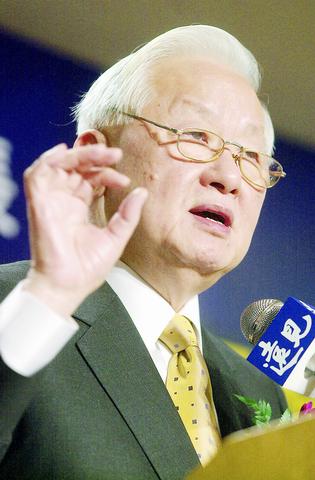The head of Taiwan's largest semiconductor company said yesterday he hopes the government will allow firms to begin operating in China so they can take advantage of its vast market.
"[Taiwan's chip industry] really hopes the government opens up and at least lets us get started in China. ... Why? There is only one reason, the market," said Morris Chang (張忠謀), chairman of Taiwan Semiconductor Manufacturing Co (TSMC, 台積電).

PHOTO: CHEN CHENG-CHANG, TAIPEI TIMES
Chang said Chinese companies typically shun chipmaking services from Taiwan because they can make purchases in China.
Cost is also an issue. Currently, the value-added tax on chips imported into China is 17 percent, versus the 6 to 7 percent tariff charged for chips imported into Taiwan. Analysts say the tariff will erode over time as China implements its WTO commitments. For now, the tariffs keep a lid on competition from places like Taiwan.
A large number of Taiwanese firms have looked to the Chinese market as a potential savior during the economic downturn. The market research firm Dataquest Inc predicts chip sales in China will expand by 6 percent this year, after declining 18 percent last year. The firm pointed out more chips were consumed in China last year, but too much competition and price erosion killed profits.
Chang said Taiwan's industry needs time to make a start in China, and hopes the government will allow companies to begin moving older, 8-inch chip-making gear across the strait. For TSMC, there is "no timetable" on when to set up a manufacturing plant in China, he said.
According to Chang Chun-yen (張俊彥), president of National Chiao Tung University, however, now is not the time for chipmakers like TSMC or rival United Microelectronics Corp (聯電) to move their manufacturing sites to China. The infrastructure there is inferior to Taiwan's, he said.
Some analysts agreed, pointing out that China currently has only one 8-inch wafer plant. Industries that produce chipmaking materials are as yet undeveloped in China, and there is not enough help available from chip equipment vendors yet, either.
In contrast, Taiwan has a mature infrastructure for the manufacture of 8-inch wafers, making it a prime location for the industry.
Still, TSMC's Chang is looking to the future and only asked for a chance to begin developing a presence in China. So far, the company has opened a liaison office in Shanghai in order to survey the market and make contacts. Back home, the company has one advanced 300mm wafer plant in production and one under construction, in addition to seven 8-inch wafer plants and two 6-inch plants.
He also debunked the myth that labor costs in China's tech industry are lower than in Taiwan, saying, "they are probably higher." Analysts agreed, saying that labor costs in the realm of 8-inch manufacturing may, in fact, be higher in China. Overall, though, costs are lower in China.

To many, Tatu City on the outskirts of Nairobi looks like a success. The first city entirely built by a private company to be operational in east Africa, with about 25,000 people living and working there, it accounts for about two-thirds of all foreign investment in Kenya. Its low-tax status has attracted more than 100 businesses including Heineken, coffee brand Dormans, and the biggest call-center and cold-chain transport firms in the region. However, to some local politicians, Tatu City has looked more like a target for extortion. A parade of governors have demanded land worth millions of dollars in exchange

An Indonesian animated movie is smashing regional box office records and could be set for wider success as it prepares to open beyond the Southeast Asian archipelago’s silver screens. Jumbo — a film based on the adventures of main character, Don, a large orphaned Indonesian boy facing bullying at school — last month became the highest-grossing Southeast Asian animated film, raking in more than US$8 million. Released at the end of March to coincide with the Eid holidays after the Islamic fasting month of Ramadan, the movie has hit 8 million ticket sales, the third-highest in Indonesian cinema history, Film

Taiwan Semiconductor Manufacturing Co’s (TSMC, 台積電) revenue jumped 48 percent last month, underscoring how electronics firms scrambled to acquire essential components before global tariffs took effect. The main chipmaker for Apple Inc and Nvidia Corp reported monthly sales of NT$349.6 billion (US$11.6 billion). That compares with the average analysts’ estimate for a 38 percent rise in second-quarter revenue. US President Donald Trump’s trade war is prompting economists to retool GDP forecasts worldwide, casting doubt over the outlook for everything from iPhone demand to computing and datacenter construction. However, TSMC — a barometer for global tech spending given its central role in the

Alchip Technologies Ltd (世芯), an application-specific integrated circuit (ASIC) designer specializing in server chips, expects revenue to decline this year due to sagging demand for 5-nanometer artificial intelligence (AI) chips from a North America-based major customer, a company executive said yesterday. That would be the first contraction in revenue for Alchip as it has been enjoying strong revenue growth over the past few years, benefiting from cloud-service providers’ moves to reduce dependence on Nvidia Corp’s expensive AI chips by building their own AI accelerator by outsourcing chip design. The 5-nanometer chip was supposed to be a new growth engine as the lifecycle